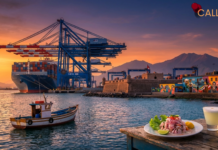
The large container vessels might become increasingly obsolete, according to the renowned economist, historian and journalist Marc Levinson, in a future trading landscape, where trade is more fragmented and regionalised, involving shipping over shorter distances, and the volume of product shipped grows more slowly due to advances in technology.
“I don’t think that these enormous vessels are really so practical, aside from the fact that they don’t really seem to have the economies of scale that were promised,” he highlighted on The Freight Buyers’ Club. “We’ve seen that they lack flexibility in the face of a changing world economy.”
He added, “The average distance of international trade is becoming shorter. I think the reasons for this are obvious. Some trade is regionalizing. In other cases, you’ve got a lot of great growth in new countries where the distance to trading partners is relatively short.
“So you might want a 25,000 TEU ship to carry freight between Shanghai and Rotterdam, but is it really the most efficient way to carry freight between Shanghai and Mumbai, or Singapore or Indonesia, or places where you’re now seeing substantial industrial growth?
“In those cases, I think the time required to deal with these giant ships in port will outweigh any advantages that may come from the size of the vessel.”
In another part of the podcast, Levinson noted that some of the new tariffs proposed by former US president Donald Trump were “a threat to trade”.
Trump has warned he will impose a universal baseline tariff of 10% on all imported goods, and tariffs of more than 60% on imports of Chinese goods if he wins the upcoming US election in November.
However, despite geopolitical flashpoints and conflict dominating the start of the current year and protectionist economic policies gaining ground worldwide, Levinson said fears in some quarters of a return of mercantilism or a new Cold War were overblown.
“I think mercantilism is probably a bit strong, but we’re definitely moving to trade in some parts of the economy being much more driven by governments,” he noted.




